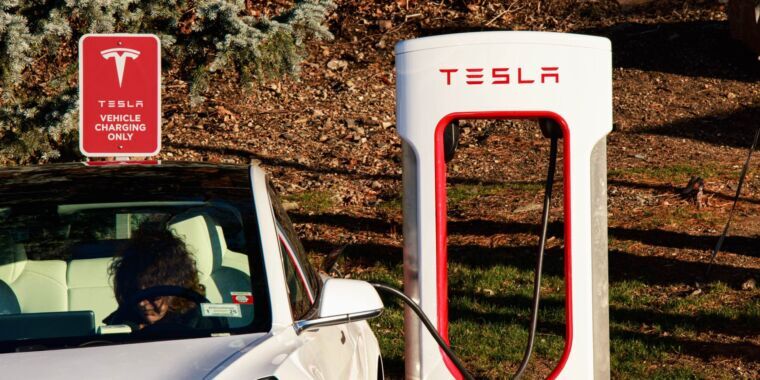Tesla exaggerating EV range for over a decade::undefined
I’ve tested in my own model 3 and the range and kwh usage is actually pretty accurate as advertised assuming you accelerate slowly, drive the speed limit, and don’t run the heat, and don’t have a strong headwind. Many people, including myself, absolutely do not drive like that, so the range will be less.
Yeah it’s all about ideal conditions, and same for ICE as the other reply said. Even external temperature matters for EVs too, if it’s too cold the battery won’t perform as well.
Wait, so you can’t use the air? You know, one of the major comfort features in a car? What a ripoff.
You can use the AC is fine and you get pretty close to the rated mileage, but the heated air is a bigger drain.
Running the heat can be energy draining because you don’t have a hot engine to draw air from. Using the heated seats is much more efficient but of course less comfortable in cold weather.
lol whats new
I am Jack’s complete lack of surprise.
Isn’t this something for the FTC to prosecute? And then after that, class-action lawsuits?
When Apple got caught extending battery life on old iPhones without user knowledge, there were lawsuits announced by the end of the day. What about Tesla?
I’m actually within about 5% ± on my Model S Plaid depending on the time of year and that’s hardly driving conservatively (maybe luck?). Oddly enough, my Model S has been more efficient than my Model 3 LR was, which I know makes no sense. But pretty much across the board for all the same drives, I use less kWh, it boggles my mind.
This is based on data from Tessie.
All that said, I realize the article says other manufacturers have more accurate fuel economies. I’m sorry, but no, my friend’s leaf is absolutely wrong by an extremely large margin, especially in winter, and has been since day one. It’s not even close.
Exaggerating?
Why don’t we try lying, bait and switch. Perhaps criminal investigation for consumer fraud?
Tell me the world isn’t a better place if elon is sent to work in a lithium mine for the next decade
Every auto manufacture exaggerates range, whether it’s battery or MPG.
If you read the article you’d know that this is actually not the case and Tesla is the one exaggerating range to this degree.
“Jonathan Elfalan, vehicle testing director for the automotive website Edmunds.com, reached a similar conclusion to Pannone after an extensive examination of vehicles from Tesla and other major automakers, including Ford, General Motors, Hyundai and Porsche. All five Tesla models tested by Edmunds failed to achieve their advertised range, the website reported in February 2021. All but one of 10 other models from other manufacturers exceeded their advertised range.”
Isn’t MPG (in the US) estimated by the EPA?
The MPGe Tesla advertised also is. Then they use that to correspond to % remaining battery.
All EVs get wildly different range depending on outdoor temps (I get 30% lower range in winter) and their hysteresis is way higher than an ICE car. But, their range numbers are accurate for when they are measured under ideal circumstances.
I regularly do better than rated range. Others have a heavy foot and do worse. Kinda par for the course.
Agreed. I’ve been driving a 2017 model s for 4 years now. When I first got it, I drove aggressively and was surprised at how low the range was compared to advertised rates, often 20% lower, 60-70miles per charge. Once I realized that I was the problem and stopped using the accelerator like an on/off switch, I started getting higher than advertised mileage on every charge (and stopped eating through tires).
I was the EV equivalent to the jack-a-lacks that drive big trucks and coal-roll. Ever see one of those assholes complain about their mpg being under advertised rates?
EVs are moving from early adopters to the beginning stage of mass adoption, so there are going to be a lot of complaints from people shifting to a new product, just like all the bitching you hear when someone switch from Apple to android or vice-versa. There is a need to fill out the charging network (for those that travel a lot or can’t charge at home), and there is a learning curve to find the sweet spot in how to operate them. Those are things people are going to complain about, probably forever.
Fortunately, the benefits far outweigh the negatives. I don’t personally know anyone that has swapped from an ICE to a Tesla (I don’t have experience with any other EVs) that isn’t ecstatic at the minimal maintenance, the ability to charge at home, the built in tech that makes it easy to use, the level of comfort… etc.
I have a charger at the house, so I’ve only used a supercharger once in 4 years… and that was more of a range anxiety thing. Turns out I made the return trip home without stopping to charge and made it fine. I don’t have to budget time to stop on my way to work. I save money not buying shit at the convenience store while I fill up. I don’t have to deal with exorbitant and wildly fluctuating gas prices. My electric bill at home fluctuates more with outside temperature than when I started charging at home.
If you don’t regularly drive more than 300 miles in a day, an EV is a no-brainer. If you routinely drive 250-300 miles in a day, you should probably figure out the habitual changes you’ll have to make before you buy an EV.






